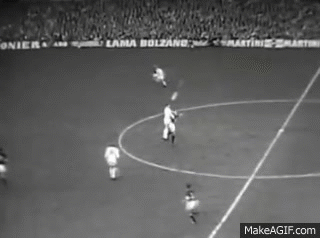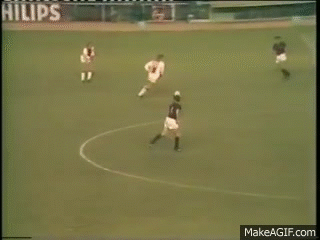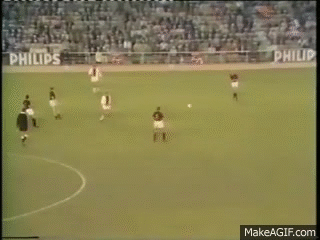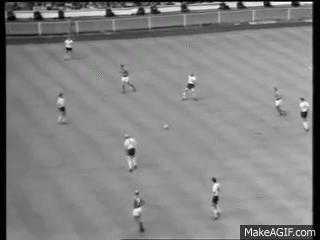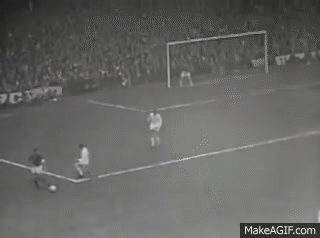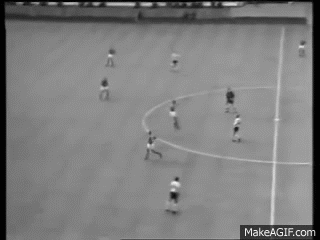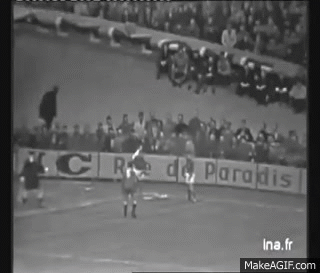Joga Bonito
The Art of Football
- Joined
- Jul 14, 2014
- Messages
- 8,300
A LAW UNTO HIMSELF

Artiste and assassin, entertainer and executioner, showman and swordsman - Denis Law. The name simply shimmers and sparkles with charisma. It whisks you off to a golden, bygone era when football truly was the beautiful game. Performing for his country, he was the Dark Blue Pimpernel, a character with a rare and spectacular combination of elegance and menace; a debonair destroyer; a master of improvisation; a contortionist in the box.
Denis was the showman supreme. He was more than a mere goal scorer whose cavalier thrusts and menacing darts brought panic to opposing defences. Law was an inspiration to those around him at club and country level and to younger generations of fans everywhere. Team-mates adored him, opponents feared him and fans revered him. He was a free spirit, an extrovert, a complete one-off, a rare combination of impudence and intelligence, class and clout. Denis Law is, was and always will be The King.
Huddersfield Town and Torino
Law started off his career at Huddersfield Town where he established himself as one of the game's most promising young talents.

He is the bespectacled kid in the bottom right hand corner
At the age of 20, he moved to City, despite attempts from Liverpool and United, for a British record transfer fee of £55,000.
Although he enjoyed his time at City, he wanted to play for a less shite club who weren't hovering around relegation places, and thus after one season, he moved on to Torino for a whopping £115,000. For better context, 26 year old Luis Suárez - in his pomp, having won the Balon d'Or and several other trophies - moved to Inter Milan from Barcelona for a world record fee of £152,000 in the same window.
Law didn't have the greatest of times in Italy as he found the football there to be joyless and overly defensive, with him being subjected to violent man marking and heavy tackling on a frequent basis. It did prove to be an eye-opening experience for the young Scotsman though.
Although his time in Italy was mixed, Law was voted the best foreign player in Italy ahead of Kurt Hamrin and the legendary Luis Suárez.
Manchester United
Once Law was on the market once more, Matt Busby was keen to sign him once again, but Chairman, Harold Hardman, hesitated as it would require payment of a record fee. Busby persuaded him, and Denis Law signed in August 1962 for yet another new British record - £115,000 - all by the age of 22.
In the summer of 1962 Lawmania would hit Old Trafford as fans instantly recognised a player brilliant enough to win games almost single-handedly. Over the next six years, he proved the catalyst for Matt Busby's final push for European glory and, though he missed the final in 1968, few doubted his influence. As distinguished Manchester United historian Brian Hughes makes clear, Law, more than any other player, typified United's flamboyance in this period.
Denis Law proved to be a pivotal figure in his first season, as Untied won their first trophy since post Munich, the FA cup. He came 4th in the Ballon d'Or voting as he notched 29 goals in 44 appearances. Law particularly had a great cup campaign, as he scored 6 goals in 6 FA cup games and would leave an indelible mark on the final.
Banks and Law would go on to have plenty of great duels for both club and country with Banks commenting "I thought Denis was a great competitor. The press often referred to him as the Electric Eel. I think Electric Heel would have been more appropriate. He had such fast reactions in the penalty box that it was as if he was plugged into the mains. I will always remember - with mixed feelings - his remarkable performance for United against Leicester in the 1963 FA Cup Final. He produced one of the greatest forward displays ever seen at Wembley and inspired United to a 3-1 triumph."
Law would then go on to bang in a stunning 46 goals in 42 games in the next season - an unprecedented feat which landed him the prestigious Ballon d'Or, making him the first ever Untied player to win it.
Law himself was surprised with the award - “Maybe there was a mistake in the mathematics,” he suggested humbly.
After all, Luis Suárez was the mastermind of Inter Milan’s 1964 European Cup and World Club Championship double. For good measure, he was the best player in the year’s European Nations’ Cup, which Spain won.
However, Law's stunning goalscoring exploits were too much to ignore, albeit it being in a trophy-less season and he won the Ballon d'Or over Luis Suárez by 18 points.
United fans absolutely adored him and idolised him. The King duly repaid their adulation with 237 goals in 404 matches during 11 seasons, which produced one FA Cup (1963), two League Championships under his captaincy (1965, 1967) and the European Cup (1968).

Artiste and assassin, entertainer and executioner, showman and swordsman - Denis Law. The name simply shimmers and sparkles with charisma. It whisks you off to a golden, bygone era when football truly was the beautiful game. Performing for his country, he was the Dark Blue Pimpernel, a character with a rare and spectacular combination of elegance and menace; a debonair destroyer; a master of improvisation; a contortionist in the box.
Denis was the showman supreme. He was more than a mere goal scorer whose cavalier thrusts and menacing darts brought panic to opposing defences. Law was an inspiration to those around him at club and country level and to younger generations of fans everywhere. Team-mates adored him, opponents feared him and fans revered him. He was a free spirit, an extrovert, a complete one-off, a rare combination of impudence and intelligence, class and clout. Denis Law is, was and always will be The King.
Huddersfield Town and Torino
Law started off his career at Huddersfield Town where he established himself as one of the game's most promising young talents.
Scottish team-mate Bobby Collins said:We heard about the lad, of course. He was making a name for himself at Huddersfield Town, but you could only go by what you read in the newspapers. There weren't television cameras at every ground as there are today, so we were still a bit in the dark about this teenager. Sometimes the press can go a bit overboard and exaggerate the player's skills. Professionals like to make up their own minds. We saw him at first-hand against the Welsh that day and, boy, could that lad play. Within minutes you instinctively knew you were in the presence of someone special, very special.
Ray Wilson - Future World Cup winning team-mate at Huddersfield said:We were staying at the same digs when Denis arrived. Honestly, we thought it must have been some mistake. He looked about 12 years old** and he told us he would be training with us. The following day we saw what he could do with a ball. We realised then he was a player. And what a player.

He is the bespectacled kid in the bottom right hand corner

At the age of 20, he moved to City, despite attempts from Liverpool and United, for a British record transfer fee of £55,000.
Although he enjoyed his time at City, he wanted to play for a less shite club who weren't hovering around relegation places, and thus after one season, he moved on to Torino for a whopping £115,000. For better context, 26 year old Luis Suárez - in his pomp, having won the Balon d'Or and several other trophies - moved to Inter Milan from Barcelona for a world record fee of £152,000 in the same window.
Law didn't have the greatest of times in Italy as he found the football there to be joyless and overly defensive, with him being subjected to violent man marking and heavy tackling on a frequent basis. It did prove to be an eye-opening experience for the young Scotsman though.
Denis Law said:I have one thing to thank it for, though. It taught me all about man-marking. I hadn't encountered that before in English football. However, it was an accepted fact in Italy that you would be shadowed everywhere you went by an opponent; sometimes two. That sharpens your game.
Although his time in Italy was mixed, Law was voted the best foreign player in Italy ahead of Kurt Hamrin and the legendary Luis Suárez.
Manchester United
Once Law was on the market once more, Matt Busby was keen to sign him once again, but Chairman, Harold Hardman, hesitated as it would require payment of a record fee. Busby persuaded him, and Denis Law signed in August 1962 for yet another new British record - £115,000 - all by the age of 22.
In the summer of 1962 Lawmania would hit Old Trafford as fans instantly recognised a player brilliant enough to win games almost single-handedly. Over the next six years, he proved the catalyst for Matt Busby's final push for European glory and, though he missed the final in 1968, few doubted his influence. As distinguished Manchester United historian Brian Hughes makes clear, Law, more than any other player, typified United's flamboyance in this period.
Bobby Charton on the arrival of Law said:I was delighted the Old Man had made a signing of such quality - it worked against the idea that the club would never touch the levels of consistent brilliance and excitement, that were achieved in the years before Munich. I told Denis this when he arrived for his first training session. I said "It's very good to have you around,' and he gave me that sidelong, slightly quizzical smile that would become so familiar to me down the years. It was as though a lot of the magic and the aura of the old United had been conjured up at a single stroke.
Denis Law proved to be a pivotal figure in his first season, as Untied won their first trophy since post Munich, the FA cup. He came 4th in the Ballon d'Or voting as he notched 29 goals in 44 appearances. Law particularly had a great cup campaign, as he scored 6 goals in 6 FA cup games and would leave an indelible mark on the final.
George Best said:I had travelled to Wembley to watch United in the 1963 final with my Dad and instantly fell in love with the Cup Final and wanted to be a part of it. The excitement was gripping right from the start as United took control and reversed the odds against a strong Leicester City.
Within thirty minutes, United took the lead when Denis Law cracked an unstoppable shot past Gordon Banks. Minutes later he almost made it two from an individual run that left three defenders trailing, and when he beat Banks his shot was cleared off the line... and a header from Law rebounded off the post (in the dying minutes of the game)...
Banks and Law would go on to have plenty of great duels for both club and country with Banks commenting "I thought Denis was a great competitor. The press often referred to him as the Electric Eel. I think Electric Heel would have been more appropriate. He had such fast reactions in the penalty box that it was as if he was plugged into the mains. I will always remember - with mixed feelings - his remarkable performance for United against Leicester in the 1963 FA Cup Final. He produced one of the greatest forward displays ever seen at Wembley and inspired United to a 3-1 triumph."
Law would then go on to bang in a stunning 46 goals in 42 games in the next season - an unprecedented feat which landed him the prestigious Ballon d'Or, making him the first ever Untied player to win it.
Law himself was surprised with the award - “Maybe there was a mistake in the mathematics,” he suggested humbly.
After all, Luis Suárez was the mastermind of Inter Milan’s 1964 European Cup and World Club Championship double. For good measure, he was the best player in the year’s European Nations’ Cup, which Spain won.
However, Law's stunning goalscoring exploits were too much to ignore, albeit it being in a trophy-less season and he won the Ballon d'Or over Luis Suárez by 18 points.
United fans absolutely adored him and idolised him. The King duly repaid their adulation with 237 goals in 404 matches during 11 seasons, which produced one FA Cup (1963), two League Championships under his captaincy (1965, 1967) and the European Cup (1968).
Martin Edwards said:Matt Busby always said of all players he had, the greatest was Law. I’d have to agree with that. I was a teenager in those days, going along to watch matches with Father. To me, Denis from 1963 to ’67 was unbelievable. In the same way you could say Paul Scholes and Ruud van Nistelrooy did in 2003, or Cantona did in ’96, he won the League for us in ’65. He was just outstanding.
Last edited:



